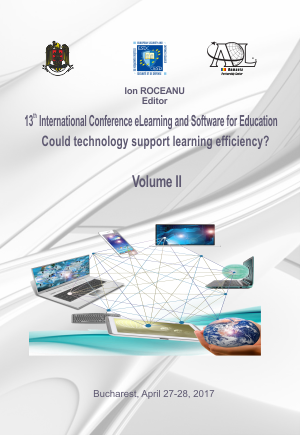IT'S REALLY FACEBOOK AN E-LEARNING INSTRUMENT?
IT'S REALLY FACEBOOK AN E-LEARNING INSTRUMENT?
Author(s): Razvan Dina, Mihaela Dobrea, Bogdan Cristian OneteSubject(s): Social Sciences
Published by: Carol I National Defence University Publishing House
Keywords: Facebook; E-learning; educational process; social networks; logistic.
Summary/Abstract: Due to the technological development and the involvement of information technology in the establishment and maintenance of human relations, educational system must adapt to the new trends. Teaching practices, the way in which knowledge is being transferred, the channels through which information is transmitted to students, have known fundamental transformations thanks to the development of information and communications technology. The use of eLearning platforms is already perceived as a traditional method of learning. At the same time, n the one hand, the need to transfer knowledge to as many students as possible was partially solved by the development of Massive open online course (MOOC) concept, and implicitly of MOOC's platforms. On the other hand, students and teachers can more easily interact online through Facebook, on subjects such as assignments, new subjects, important links, the social network being a facilitator of exploration for students, bringing to light a better collaboration in the search for answers, circumstances and clarifications. According to comScorec, people spent more than 14% of time reading feeds and posting on Facebook. Because of that, we think that Facebook can become an important learning tool for the educational process. In order to test and confirm our theory, an experiment was conducted among a group of students which study logistics at the Bucharest University of Economic Studies, Faculty of Business and Tourism. In this respect, a closed Facebook group (LogIQ) was created, where were invited the students part of the focus group in the hereby research. Brief materials presenting a concept or a technique used in logistics were posted from time to time, during a whole month, and the students were encouraged to Like the information is relevant for them. At the end of the period the impact of the posts as far as knowledge acquisition is concerned, was evaluated.
Journal: Conference proceedings of »eLearning and Software for Education« (eLSE)
- Issue Year: 13/2017
- Issue No: 02
- Page Range: 62-67
- Page Count: 6
- Language: English

